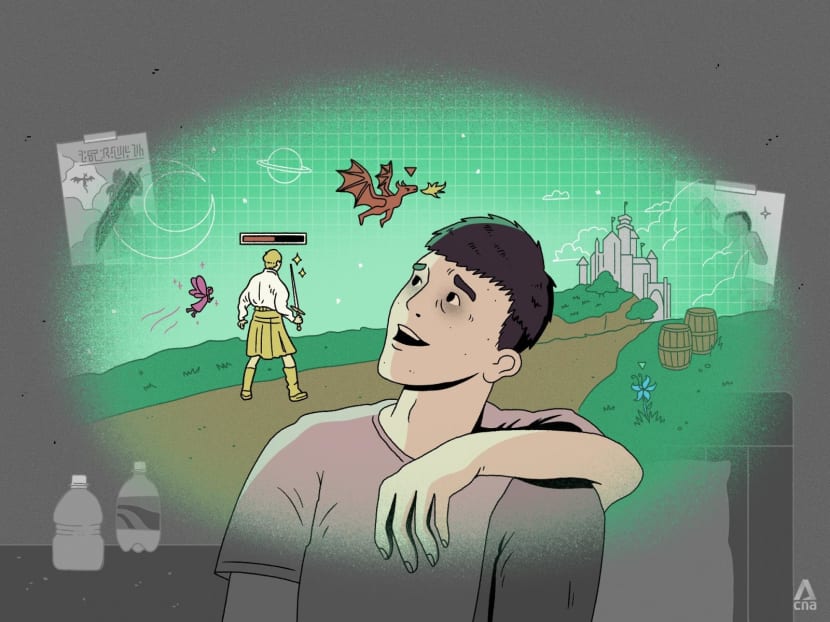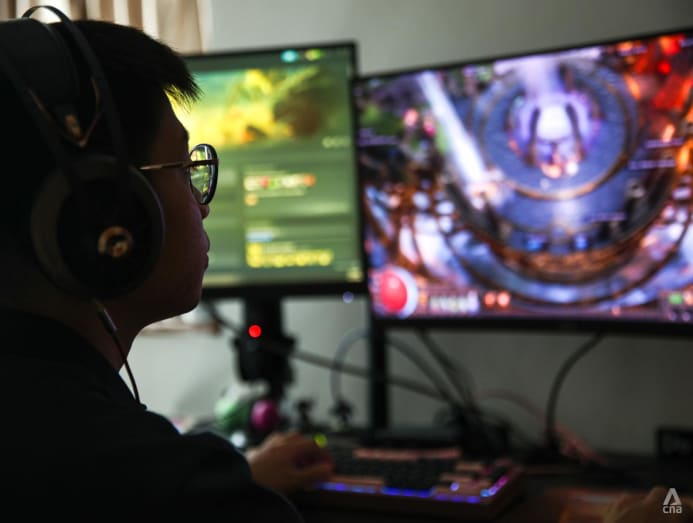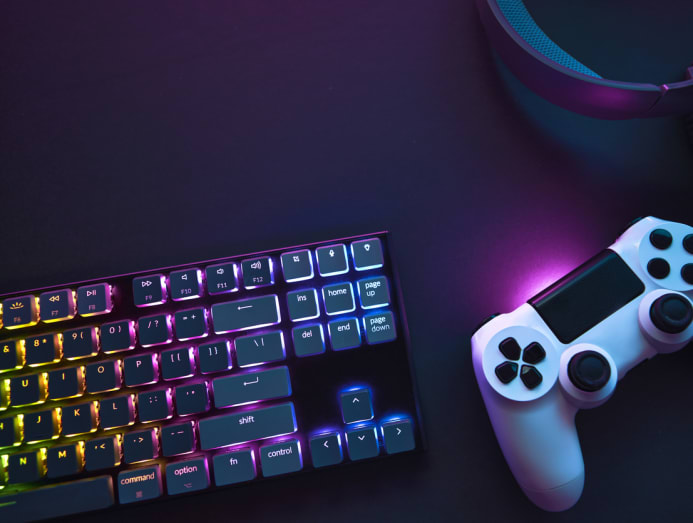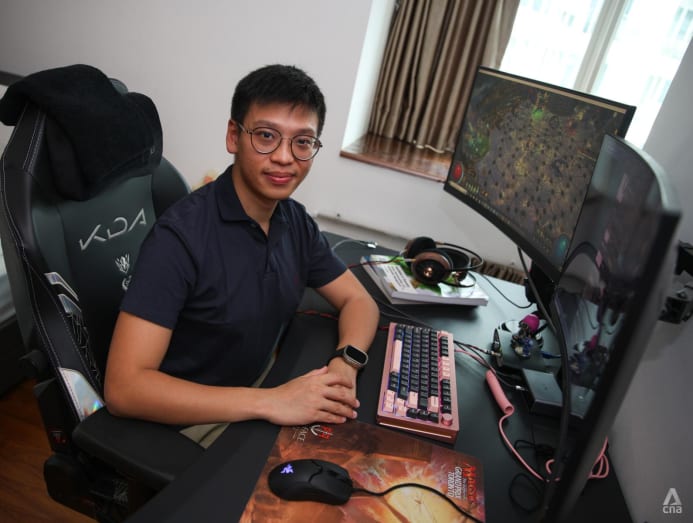Gaming addiction often brushed off as a lack of discipline, but it's a far deeper problem
Experts say a gaming addiction often points to an underlying mental health condition such as depression. There is also a risk that excessive gaming may spiral more easily into a gambling addiction, as game developers refine their tactics to get gamers to spend more while playing.

(Illustration: CNA/Nurjannah Suhaimi)

This audio is generated by an AI tool.
When Ms Tan tried to take away her younger sister’s devices in August, the 12-year-old, who had been playing the video game Genshin Impact non-stop, threatened to commit suicide.
The girl had been addicted to this particular game for more than a year and would be glued to it for 10 hours a day. Since she had been given an iPad as a toddler, she had been compulsively playing different games for a decade.
It was also not the first time she had threatened to harm herself, and she had tried to carry out her threats in the past.
“She would cut herself. And because we live on the 13th floor, she would unlock the main door and try to jump off (the housing block). Then my whole family had to hold her back,” the 23-year-old teacher said.
Ms Tan asked not to publish her first name because this remains a sensitive matter in her family.
She said that the family did not intervene when her sister was younger because they did not comprehend the severity of gaming addiction.
They knew that children of the digital generation grew up surrounded by technology, so they dismissed her gaming addiction as a "phase" and believed that she would eventually mature and wean herself off games.
"But it's already been years and there's no change," Ms Tan said.
Her sister has stopped going to school since June, even though she completed the Primary School Leaving Examination this year. Ms Tan said that her sibling is completely isolated from the physical world and has no friends in real life.
The gaming addiction worsened to the point where their mother discovered S$1,700 drained from her bank account in September – the 12-year-old had stolen her credit card to spend on Google Play credits.
This was the final straw that made the family realise that what they had on their hands was a serious problem.
Ms Tan’s sister was diagnosed with depression in June and has been seeing a psychiatrist at the National University Hospital since then.
The young girl is just one of many who are hooked on gaming to the detriment of her health. Gaming addiction, clinically known as gaming disorder, was recognised by the World Health Organization in 2018 and included as a mental disorder under its International Classification of Diseases.
In Singapore, both adults and adolescents have fallen prey to this addiction and sought help from mental healthcare services.
A social service agency and a clinic that spoke to CNA TODAY said they have observed a spike in cases, especially during the later period of the COVID-19 pandemic and its immediate aftermath.
We Care Community Services, an addictions recovery centre, said that it had 32 referrals in 2019 for people with internet gaming problems.
The number went up to 40 last year and it expects this figure to be higher by the end of 2024. The centre already had 40 referrals as of September this year.
Promises Healthcare, a clinic that offers addiction therapy among other services, saw six clients for gaming disorder in 2022 and five in 2023, as opposed to a single case in 2020. But the wave has since died down and the clinic has had one client so far this year.
Now that the school holidays have begun, many of the young are likely to be binge-gaming as they have more free time on their hands.
So at what point does excessive gaming turn into a disorder? CNA TODAY spoke to experts to find out more about what differentiates a deep love for gaming from a serious addiction, and how families can help those who are ensnared in addiction.
A CAUSE FOR CONCERN
Addiction therapists interviewed by CNA TODAY said that parents and society at large often mistake gaming addiction as a sign of laziness, but it is almost always linked to other conditions such as social anxiety and depression.
School bullying and stress can lead to such gamers finding a "safe" space with the gaming world, they said, adding that their clients tend to be mainly male, with an equal split between adolescents and adults.
The addiction can spiral and affect all aspects of their lives. Ms Juliana Pang, psychotherapist at private practice Therapy-Help, said that gaming addicts tend to neglect caring for themselves, eating irregular meals and failing to maintain personal hygiene. They also lose interest in anything that is not game-related.
“The real impact is felt when they start losing important relationships and struggle to carry out daily activities such as school or work,” Ms Pang added.
“Given that they spend more waking hours playing games than in the world away from the device, they will struggle to re-engage with people. This gets more difficult if their family, school or peer environment are not favourable.”
Dr Melvyn Zhang, a consultant with the National Addictions Management Service, agreed that an addict’s health and academic performance may decline, and this may involve truancy.
A former gaming addict attested to this: Mr Wan Tse Shuen, 30, used to play compulsively for seven years when he was an undergraduate student in Canada undertaking courses in chemistry and computer science.
He started skipping classes and examinations, and was a repeat student for multiple semesters. He “ate junk food all the time” and became obese, weighing 90kg at his lowest point.
Gaming was a way to cope because he felt directionless in life.
Mr Wan said: “I really hated what I was studying. I was disconnected all the time because it took me so long to do my readings. It was hard to focus on something I didn’t like.”
And so, online friends were the only people he interacted with for 12 hours a day, and he became so socially distant that he did not contact his parents in Singapore for more than a year.
“It was self-destructive behaviour because I felt like my life would not amount to anything.”
Things hit rock bottom when Mr Wan attempted suicide. He was admitted to the hospital and his mother discovered the severity of his condition only when she flew over to see him after the hospital contacted her.
She convinced him to return to Singapore. After coming home, Mr Wan attended regular counselling sessions to get professional help for his addiction and depression.

THE WORST IS YET TO COME
Experts predicted that gaming disorder may become an even more serious problem in the future as technology continues to evolve, making games even more immersive and engaging – thereby raising the chances of getting addicted to them.
“Games design has increased its use of artificial intelligence (AI) and augmented reality. This continued erosion of the line between physical and virtual reality can present greater difficulties for the individual in recovery,” Ms Pang the psychotherapist said.
“With an AI-powered, realistic replacement of the physical world, the person may struggle to build a healthy mental model and their interactions with the physical world."
There is also a risk that excessive gaming may spiral more easily into a gambling addiction as game developers refine their tactics to get gamers to spend more while playing.
Dr Jeremy Sng, a lecturer at Nanyang Technological University (NTU) who researches the psychological impact of video games, said that micro-transactions such as buying loot boxes, which are digital goodie bags with rewards, may become more sophisticated and the psychological hook may be less obvious to players.
This would make it even harder for them to resist spending.
Loot boxes offer a small chance of winning big. Players get a chance to obtain valuable items, which enhance the abilities of game characters or provide cosmetic enhancements to the characters.
The actual chances of getting rare items are kept low so that players are inclined to keep buying until they finally get what they want.
Dr Sng added that navigating the conflict between having regulations to protect vulnerable populations and allowing the game sector to develop will be a significant challenge.

Mr Andy Leach, a principal addictions psychotherapist at Promises Healthcare, said that "addiction interaction disorder” among people hooked on gaming is already prevalent.
This refers to the condition when a person has multiple addictions that coexist and reinforce one another.
“I’ve had clients whose gaming problems led to financial problems, when they borrowed excessively or stole money from their families to feed their habit, to pay for better character skins or weapons in the game,” he added.
He explained that people think the online world does not feel real, which causes them to ignore their normal boundaries and moral codes.
In an online game, for example, someone can drive a car at 300kmh and shoot a policeman. Mr Leach said that this lack of boundaries transfers to other forms of addictions linked to money, sex and cyberbullying.
“All these things you wouldn’t necessarily do in the real world, but it’s much easier to do online. Just sit anonymously at home, get on a computer and away you go.”
TURNING TO GAMING FOR "SUCCESS"
Giving another view on why the young are turning to gaming and bent on playing persistently, one gaming association official said that young people think they can make a living by being a professional gamer and it is a straightforward path to success.
But as with most things, they do not realise that behind the glamour and fame, it takes much more to be a winner than they are willing to give. The industry is highly competitive and requires significant dedication, personal sacrifices and talent.
Before they get in too deep, it helps to lift the veil so that they become aware of this reality.
Mr Dennis Ooi, president of the Singapore Cybersports & Online Gaming Association, said that he has encountered young people who want to be e-sports athletes and they believe they can succeed by simply gaming for long hours.
Sometimes, they play so much to the extent that they wake up late and miss school.
In doing their part to foster healthier gaming habits, the association's trainers visit schools to conduct workshops that involve playing video games while developing the students' soft skills.
These sessions show the youth the difference between being a professional and what they may think is the road to being a successful e-sports athlete.
The participants are challenged to practise gaming in a structured manner. They have to reflect on previous games, understand what went right and wrong and plan for the next practice.
This helps to instil discipline when gaming, guiding them to discern the difference between unstructured play versus competitive players' training regime.
“After a certain amount of time, they may realise that becoming a professional gamer is not what they want because of the discipline and sacrifices needed,” Mr Ooi said.
“Our approach is quite different from other social service agencies where they go and tell the young that they are playing too much.
“We’re not here to tell you whether you should be playing, but we’re going to let you realise that what you are doing is not going to get you to where you want to be.”

WHEN DOES GAMING BECOME AN ADDICTION?
There is a distinction between excessive gaming and addiction. So when does a heavy gamer become an addict?
Ms Pang the psychotherapist said that it boils down to whether one has the ability to cut back on or stop gaming when the negative impacts outweigh the benefits.
Heavy gamers may prioritise gaming over other responsibilities for a period – for example, in the days after starting a new game – but they know when to stop and find balance.
On the other hand, those with a disorder would continue playing even if it starts to harm their physical and mental health. This pattern of behaviour has to be observed over at least 12 months to be considered a disorder.
At this point, it will be necessary to seek help.
Dr Sng from NTU added that gaming becomes problematic when people play to escape their real-world troubles in the long term and do not get back to resolving them.
“The situation merely worsens and it will be associated with increased anxiety when they step out of the game, realising that they still have these problems around.”
Escapism was what drove administrative executive Quina Yap, now 23, to play online games compulsively during her secondary school years. Though she has since learnt to manage her gaming habits, she recalled how much it affected her life back then.
She would game for at least five hours every day after school, neglecting her homework. This took a toll on her academic performance and she had to repeat a year in Secondary 3.
In the virtual world, she had online friends to talk to and game with, as opposed to school, where she felt isolated and lonely, she said.
“I have a bad tendency to solve problems by running away from them. Back then, gaming was a way to run away from my real-life problems, but I realised that’s not very healthy," she added.
“At that time, I would really wish that I was in another world.”
Teenager Art Ng, 17, had a similar experience. The polytechnic student’s addiction to video games started when he was in Primary 5. It got worse during the COVID-19 pandemic when he played from morning to night – about eight to nine hours every day.
He used gaming as a way to ignore his own thoughts because he experienced “extreme bouts of loneliness”. Art felt disconnected from his real-world friends, which pushed him to consider suicide by the time he was 14.
“Gaming helped me to avoid thinking about the idea of suicide and led me to socialise with young people from other parts of the world whom I don’t think I would ever meet in real life,” he said.
He did not know how to voice out his emotions and thought that by getting better at gaming, it would garner attention from his online friends and make him feel validated.
In 2021, he splurged S$1,000, his entire first paycheck from working as a packer at his aunt's business, on the game Mobile Legends.
“Gaming definitely affected my perception of money. I keep forgetting that money is not that easy to come by,” he added.
Over time, he soon realised that gaming was becoming less effective in helping him to escape his negative headspace.
“Now I know that it was a really dumb way to approach (my problems).”
Although he still games for one or two hours each day, he is aware that he should not rely on gaming as a “crutch” and does not risk his mental health for it.
HOW TO DEAL WITH A GAMING DISORDER
Mental health experts stressed that family support is essential in a gaming addict’s recovery process.
Any form of addiction is tainted with stigma, Ms Pang said, and society at large might not fully understand that addiction is not necessarily linked to character defects and poor willpower.
“Therefore, having a supportive family or peer group environment that validates the person’s struggles can go a long way towards creating a non-judgemental and non-shaming environment for recovery.”
Dr Zhang from the National Addictions Management Service said that it is important to dive deeper and explore the underlying reasons for someone’s excessive gaming because this can help to detect any potential issues – such as using games as a form of escapism – and to promote healthier habits.
However, there are still barriers to truly addressing gaming disorders.
Ms Pang said: “I suspect there is still a lack of understanding from parents that the condition can be debilitating and difficult to overcome.
“The tendency is to see gaming addiction as a 'soft' condition, unlike a gambling or substance addiction.
"If not taken seriously, clients cannot successfully learn to re-adapt to the physical world and there will often be self-harm and suicidal ideation behaviours.”
Mr Narasimman Tivasiha Mani, who is the co-founder of Impart, a charity that helps youth facing adversity, said that gaming addiction is often dismissed as a lack of discipline rather than viewed as a mental health issue.
Addressing the stigma requires educating the public and families to recognise that excessive gaming can indicate deeper emotional needs, rather than simply a lack of self-control, he added.
Other than family support, there are programmes offered by government bodies, social service agencies and non-profit organisations to provide alternative means of intervention and prevention.
For example, the Ministry of Education’s cyber wellness programme helps students gain skills to protect themselves, support their peers and seek help when faced with a habit of excessive gaming.
Touch Community Services, a non-profit organisation, has a cyber wellness initiative that aims to cultivate digital literacy in the community.
Apart from cyber wellness education, it also offers a six- to nine-month-long intervention programme called DigitalMindset that aims to help those aged between 12 and 21 to strike a balance between device use and real-life responsibilities.
At Impart, a project called Meta integrates play and group therapy. The 12-week programme combines e-sports training with activities and discussions, guiding young people to explore their life goals.
The aim is for them to pick up e-sports techniques and become more disciplined gamers while growing as individuals. Impart said that this year’s cohort has graduated but the project will restart next year.
Vox, a service centre launched in 2015 by the Singapore Children’s Society, organises gaming interest groups for those aged 13 to 18. Sessions are helmed by a professional e-sports coach and a staff member from Vox.
Mr Chee Thow Wei Liat, deputy director and head of Vox, said: "Through the coaching and group work sessions, youth have given feedback that apart from improving their skills in-game, they were able to better adopt an analytical mindset and communicate in a team setting to deliver their ideas more efficiently, while also strengthening the bonds between them and their friends."
He believes that these skills are transferrable outside of gaming, and help support young people in areas such as mental health, social relationships and academic challenges.
Over at the Singapore Cybersports & Online Gaming Association, apart from the workshops done in collaboration with the National Youth Council for young gamers, its Train-The-Trainer programme teaches educators to understand a youth’s developmental stages through the gaming lens – what games are popular with the young, as well as their motivations and internet habits.
The course empowers practitioners with the tools to better engage youth in their line of work.
JOURNEY TO RECOVERY
With professional help, gaming addicts such as Mr Wan and teenager Art have managed to overcome their addiction.
Mr Wan failed to graduate from university in Canada because of his compulsive gaming habits, but he decided to give himself a second shot.
He is now pursuing a degree in psychology at the Singapore Management University and hopes to become a therapist and help other young people who have addictions.
“I haven’t seriously played a game in three years. I feel like I have other more meaningful things to do in my life now, which I think has never been the case before,” he said.
The third-year undergraduate even got a scholarship last year and is doing “reasonably well” in his studies because he is “genuinely interested” in what he is learning.
Reaching this point has not been easy. Upon coming back to Singapore, Mr Wan joined an intensive rehabilitation programme for behavioural addictions.
At that time, he was depressed and was not motivated to do anything. He had to go for therapy sessions twice a week for two months and consulted a psychiatrist to get medication.
Afterwards, he took part in group therapy sessions where he talked to other gaming addicts in their 20s.
“I just felt very inspired because I remember sharing about how I tried to tackle my issues. Back then, that was the only thing I could manage to do.
“And then I approached it one thing at a time, and it kind of built on itself,” he added.

One of the biggest problems was figuring out how to occupy the hours that he used to spend on gaming.
Mr Wan said that he tried to fill his time with activities so that he would not think about gaming the whole day.
That led to him taking up a part-time job at an indoor cycling studio. He started taking fitness seriously, spending significant amounts of time working out and improving his health.
At the time of his interview with CNA TODAY, he was writing a paper about the prevalence of gaming disorder, and he wants to be a therapist because he feels that he could make a big difference.
“It’s a pretty meaningful job. I think I have a lot to offer, just because I grew up in this age," he said.
“A lot of professionals are slightly older and it’s very hard for them to relate to what it means to be super addicted (to the digital sphere), or what it means to grow up as a child and be an 'iPad kid'.”
Art, the polytechnic student, took part in the coaching sessions by Impart. Through these, he learnt how to manage his time and take care of his mental health while gaming.
He now engages in other activities such as riding his bicycle and inviting people to hang out with him. These curbed his urge to game excessively.
He also helps out with facilitating group therapy at Impart.
To people finding it hard to unchain themselves from gaming, he said: “It’s okay to feel this way. But if you ever feel as if your mental health is in jeopardy, go ahead and reach out to others.
“There are people out there who will really enjoy your presence.”















